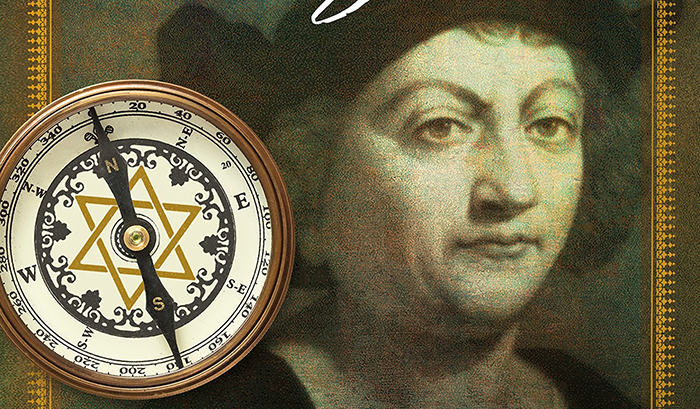Dateline Jerusalem — A friend and I were discussing the origins of his Spanish surname because I realized it is also a Hebrew word that was mentioned in the Torah. According to DNA tests, he has a small amount of Jewish ancestry. This is not unusual considering the number of Spanish Jews forced into conversions during the Inquisition in Spain and Portugal.
“Conversos” actually converted and embraced Catholicism. Christopher Columbus’s family allegedly was “Marrano.” They were Jews who were forced to convert but secretly practiced Judaism. Columbus’s last will and testament included provisions that are Jewish customs. Because the day he originally was scheduled to sail fell on Tisha B’Av, which marks the destruction of the First and Second Holy Temples of Jerusalem, he postponed his trip from Spain for one day so he would not have to travel on Tisha B’Av.
There was an edict that all Jews had to convert or leave Spain by that date or be killed. Spain now is offering Spanish citizenship to descendants of those Jews.
In the left hand corner of my emails, I write the letters B”H, which stand for the Hebrew letters bet-hei, meaning b’ezrat Hashem (with G-d’s help).
Observant Jews have added this blessing to their letters for hundreds of years. Columbus wrote this on all his letters to his family members, but not to outsiders, keeping with the secret Jewish practices of Marranos, crypto-Jews, who only pretended to be converts to stay alive.
Multiple Languages
The language of Ladino, originating in 1492 when the Jews were expelled from Spain, is also known as Judeo-Spanish, Crypto-Jewish, and Sephardic. Yiddish was the language of Ashkenazi Jews who mostly came from Germany and Eastern Europe. Hebrew was used only as the language of study and prayer. Ladino is like Yiddish in that both are influenced heavily by Hebrew words. They were the languages spoken at home. Even the Greek alphabet is derived from the ancient Hebrew alphabet.
The English language is heavily influenced by Hebrew and Yiddish. It is amazing how many words we take for granted have their origins in those two ancient languages. The magical word “abracadabra,” spoken by magicians performing tricks for their audiences, is really Hebrew. It means “I create as I speak.” A’bra means “I will create” and K’dabra means “as I speak.” Those familiar with the “Beach Blanket” and “Gidget” movies of the 1960s might remember the Big Kahuna, referring to the Hawaiian Kahuna or priest. In Hebrew, Kahuna refers to the holiness of the priests (Cohanim) who officiated in the Holy Temple in Jerusalem. Even the Vatican in Rome takes its name from Hebrew. The Hebrew word “Vatikin” means elders. The Vatican was founded by the elders of the Catholic church.
Taking Time Off
The word “sabbatical”, often associated with teachers and professors who take off for a resting period every seven years to travel or study, is Hebrew in origin. It comes from the Hebrew word Shabbat, the seventh day of the week, Sabbath, and a day of rest.
Other English words derived from Hebrew or from events in the Torah include: maven, ruthless, copacetic, leviathan, cabal, camel, beezelbub, sapphire, edenic, babble, jeremiad, brouhaha, bedlam, macabre, and even bath. In Hebrew, bath is a liquid measure close to 10 gallons or what might fill a bath tub.
My favorite Hebrew word that has become common to Jews and gentiles alike is chutzpah. It cannot be explained by a one- or two-word definition. It is often used to describe extreme arrogance, audacity, guts, nerve, and outrageous behavior. The only way to really describe chutzpah is to relate the following: A child is in court because he has murdered his parents. He begs the judge for mercy because now he is an orphan! That is chutzpah.
Yet the English language, at least in America, is full of Yiddish words that are like chutzpah. Only explanations can define them. How many of you remember the “Laverne and Shirley” TV show’s theme song? At the opening of the show they recite the Yiddish-American hopscotch chant, “1,2,3,4,5,6,7,8 Schlemiel! Schlimazel! Hasenpfeffer Incorporated.” A schlemiel is a clumsy oaf or dolt. A schlimazel is a person unlucky most of the time. The difference between them is described by the aphorism:The schlemiel spills his soup on the Schlimazel.
How many of following Yiddish words incorporated into the English language do you recognize? Bagel, blintz, knish, nosh, nudnik, kvetch, latke, lox, mamzer, yutz, klutz, yenta, schlep, dreck, glitch, bupkis, hock, kasha, chozzerai, kibitz, zaftig, mensch, minyan, mishugaas, nebbish, noodge, shlock, tush, shlub, shmatta, plotz, shmear, shmo, shmooze, shvitz, schnozz, schmendrik, shmutz, shtick, shnook, tchotchke, shpiel, tummler, tzuris. Many vulgar words that I won’t list here are recognizable as Yiddish when you see or hear them. Yiddish is such a descriptive language
L’hitraot. Shachar. (By the way, Shachar in Hebrew means Dawn.)






